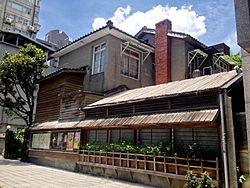Wistaria Tea House facts for kids
Quick facts for kids Wistaria Tea House紫藤廬 |
|
|---|---|
 |
|
| Restaurant information | |
| Established | 1981 |
| Current owner(s) | Wistaria Cultural Association |
| Street address | Daan, Taipei, Taiwan |
The Wistaria Tea House (Chinese: 紫藤廬; pinyin: Zǐténg Lú) is a famous historical teahouse in Taipei, Taiwan. It is also known as the Wisteria House. This special place is located in Daan District.
The building itself is a beautiful Japanese-style wooden house. It was built way back in the 1920s. You can find it on Xinsheng South Road. The teahouse gets its name from three lovely wisteria vines. These vines grow in the front yard. They create a cool, shaded path leading to the entrance.
The Wistaria Tea House has a classic look from the 1930s. It was closed for a while for important repairs. Then, it reopened in 2008 to lots of excitement. This teahouse was even used as a filming location for the movie Eat Drink Man Woman.
Contents
A Look at the History of Wistaria Tea House
Early Days of the House
Before 1945, when Taiwan was under Japanese rule, this house was a home. It was used by the person in charge, called the Governor-General of Taiwan. After 1945, the Republic of China government took over. Around 1950, the building became dormitories for government workers.
Becoming a Teahouse and Meeting Place
In 1981, the building changed again. It became the Wistaria Tea House we know today. During the 1980s, Taiwan was going through big changes. This teahouse became a secret meeting spot. People who wanted Taiwan to become a democracy met here. One important person who met there was Lei Chen.
A Place for Artists and Thinkers
Since then, the Wistaria Tea House has been a favorite spot. Many artists, writers, and smart people from Taipei meet there. They come to share ideas and talk.
Recognized as a Historic Site
The Taipei government saw how important this place was. In 1997, they officially named it a historic monument. This means it is protected and its history is valued. The Wistaria Cultural Association now helps run the teahouse. They work with the Taipei City Cultural Bureau to keep this special place alive.
Images for kids




